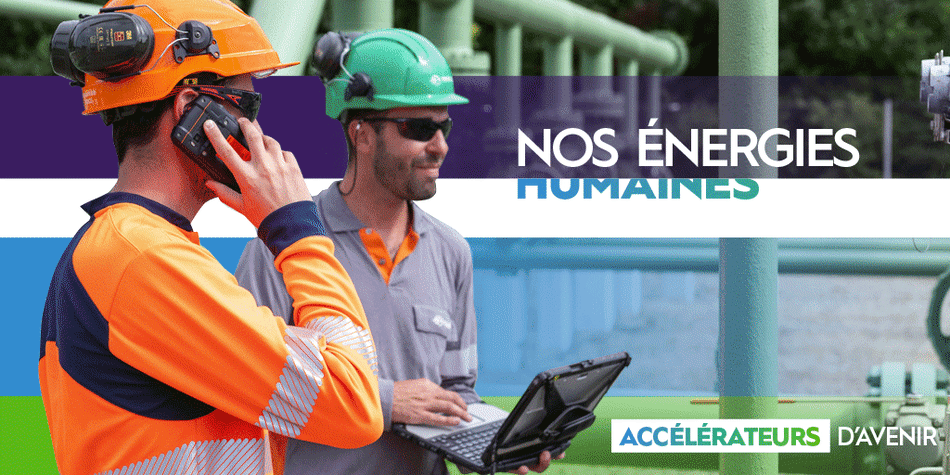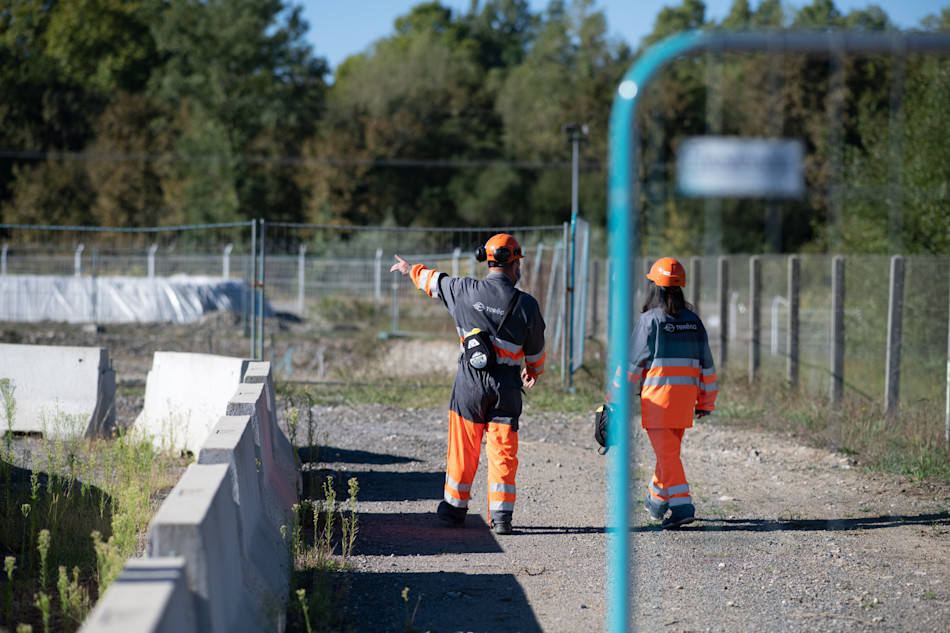Urgence gaz 0 800 028 800

Teréga launches its employer brand: “Our plural energies”
As business ramps up again after the summer, Teréga is unveiling its employer brand, with the aim of showcasing employees who, by developing and joining their skills, are helping accelerate the energy and digital transition. That certainty is reflected in the slogan: “Our plural energies”.
What message is Teréga hoping to put across with its slogan “Our plural energies”?
This slogan reflects our conviction: it is the individual and collective power of human energies that shapes Teréga. Rather than being focussed solely on the company’s operational excellence, we absolutely want to increase the added value that comes from our employees. Both those working with us now, and those we’ll attract tomorrow. We’re convinced that Teréga’s success in meeting the challenge of the energy transition is highly dependent on commitment. It is these people who, by developing and joining their skills, will help Teréga realise its ambitions.

Why did you choose to launch the employer brand this year? Is this a strategic venture for Teréga?
The launch of our employer brand addresses two different issues. Firstly, Teréga has committed itself to diversifying its activities with the creation of its Teréga Solutions subsidiary, which develops innovative solutions for energy performance. It is therefore important for us to attract new talent to the company, while continuing to derive the maximum benefit from our employees who have worked so hard to keep the business going throughout the pandemic.
Secondly, we’ve made a number of commitments with other actors to establish new frames of reference for jobs in the “new energy systems industry”. To take just one example, we’re working with Lacq-Pau-Tarbes Industrial Territory, an initiative launched by the government and the French National Industry Council in 2019, and with the Energy Transition Jobs and Qualifications Campus. We’re also supporting the national education system with the Étincel platform, to help with the creation of educational content for teachers and students about energy, ecological, digital and social transition. The energy transition is a challenge for the future, and we increasingly need to direct professional development and training to that end.
Why is it so important to teach people about jobs in the energy transition?
As a public service operator, Teréga bears a corporate responsibility toward the energy industry and the territories in which it operates. Our mission is to support the energy transition through innovation, making sure at the same time that it will be a source of economic development for our territories. To achieve that, it’s important for us to familiarise young people with the exciting and sustainable career opportunities offered by the energy industry.
It is also vitally important to show that those jobs can provide a solution to the challenges of integrating the long-term unemployed and the disabled into the workforce. Indeed, the energy transition affects the work we all do, in both operational and support roles. That’s why we need to encourage training and career changes into these new or evolving jobs, which are essential for the development of the territories.
It is against this backdrop that we contributed to the creation of the Pyrénées Cloud Academy with the CESI, which offers training in Cloud computing jobs (DevOps, DataOps, DevSecOps etc.), in partnership with companies in the territory. This is a way of fostering vocations in the jobs of the future, and developing digital skills in the territories.
What are the jobs of the future in the energy sector?
Jobs of the future are jobs of today that are being transformed, hence the importance of us investing in skills. The target of a 100% renewable energy mix in 2050 will see natural gas disappear from our grids over time. Technicians and operational staff are already beginning to be made aware of and trained for this change. This is also being factored into the school curriculum. This evolution applies to support roles too: financiers and legal experts, for example, must specialise in the rules of an energy market undergoing profound change.
The energy transition, which is closely linked to the challenges of industrial digitisation, has also brought with it the creation of new jobs: energy efficiency specialists, ecologists, data engineers, multi-energy managers, IOT architects, alongside new specialisms in engineering.
What criteria are used at the moment to assess candidates’ and employees’ commitment to their company?
At Teréga, we carry out a commitment survey among our employees every two years. As an employer, it is crucial to be alert to what those working in the company are feeling. We know that the quest for meaning in one’s working life is an increasingly important consideration for the younger generations, but the same is true among more mature personnel too. The findings from the latest survey confirmed that need for meaning across our workforce. They are driven by the desire to make a contribution that is in the general interest, and to help the energy transition.
The high level of safety in how we conduct our activities is also frequently emphasised as being one of our strengths, as much by our employees as by our stakeholders. As a whole, the findings show that our employees can see themselves in Teréga’s values: responsibility, cooperation, innovation and ambition. These are values that truly reflect our desire to be a responsible actor and our conviction that the future will be built using the talents of today and tomorrow. That ambition is carried forward by the energies of all, for all.

What actions are you taking to turn this vision into a reality within the company?
Teréga is investing significantly in the skills and professional development of its employees. Our first commitment is to support changing roles in the energy industry by offering a varied and innovative skills development programme. For example, we have launched a platform on which each person can carry out their own professional and personal skills assessment, as and when they wish, and test their ability to develop professionally. This approach enables the worker to be the actor in their own development, to envisage their future and look at their training needs to construct their career path.
We also encourage all our employees to take part in all Teréga’s participative innovation initiatives. So an innovation challenge is launched in-house every year, on a variety of subjects such as: safety, environment, information sharing and so on. The large numbers of people taking part show that the spirit of innovation is being nurtured with great care at Teréga!
And this attitude can be seen in all aspects of our corporate life. To take just one example: for our quality of working life programme, Capital Forme, we approached the performance management team at Élan Béarnais to contribute their expertise. By looking at the different work situations in Teréga, they helped us set up some highly diversified support modules to help foster physical, mental and social wellbeing among employees. We provide them with tools to get to know themselves better, to manage their work situations as well as they possibly can, and to take care of themselves. When the first lockdown came along, Capital Forme adjusted its content to include online sports coaching, video conferences on mental workload, and informal sessions to maintain social links. Great support for many employees at this difficult time.
Has the pandemic led to other changes at Teréga?
Teréga had already started its digital transformation a number of years ago, so all the necessary tools and arrangements for remote working were already available, up and running. As a result, we had no difficulty in switching over to remote working. Nevertheless, it was important to support managers through that change. That’s why we moved over to more of a “manager coach” approach, where they were able to work both on site and remotely, encouraging greater autonomy and confidence within their teams.
Over that period, the health and HR teams also sprang into action to answer questions from employees and to help them manage their work situations in the best possible way. That individualised support won the approval of 95% of our employees*. For us, this result proves that putting people at the heart of our strategy is an essential condition if we’re going to be able to adapt to changes in the world of energy and in society.
* Of the 71% who responded to the 2020 in-house survey on our handling of the pandemic.








